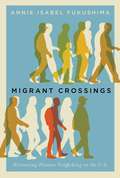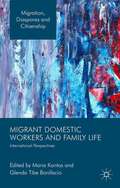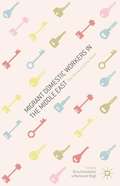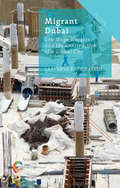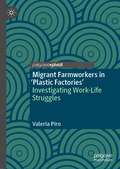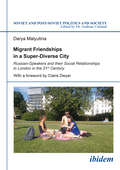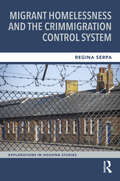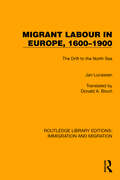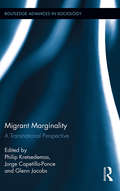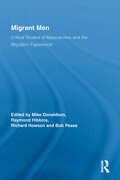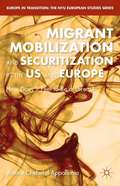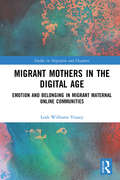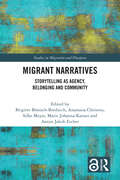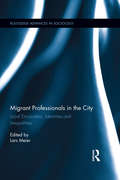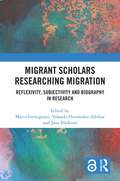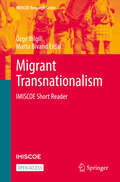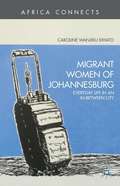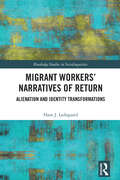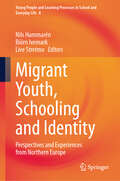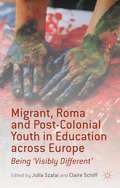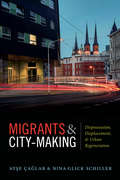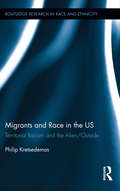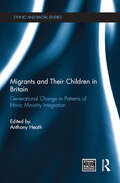- Table View
- List View
Migrant Crossings: Witnessing Human Trafficking in the U.S.
by Annie Isabel FukushimaMigrant Crossings examines the experiences and representations of Asian and Latina/o migrants trafficked in the United States into informal economies and service industries. Through sociolegal and media analysis of court records, press releases, law enforcement campaigns, film representations, theatre performances, and the law, Annie Isabel Fukushima questions how we understand victimhood, criminality, citizenship, and legality. Fukushima examines how migrants legally cross into visibility, through frames of citizenship, and narratives of victimhood. She explores the interdisciplinary framing of the role of the law and the legal system, the notion of "perfect victimhood", and iconic victims, and how trafficking subjects are resurrected for contemporary movements as illustrated in visuals, discourse, court records, and policy. Migrant Crossings deeply interrogates what it means to bear witness to migration in these migratory times—and what such migrant crossings mean for subjects who experience violence during or after their crossing.
Migrant Domestic Workers and Family Life
by Maria Kontos Glenda Tibe BonifacioThis timely and innovative book delivers a comprehensive analysis of the non-recognition of the right to a family life of migrant live-in domestic and care workers in Argentina, Canada, Germany, Italy, Lebanon, Norway, the Philippines, Slovenia, South Korea, Spain, the United Arab Emirates, the United States of America, and Ukraine. Combining legal, sociological and social policy perspectives, it takes an interdisciplinary approach to international and national legal frameworks, the political economy of globalised reproductive labour, and the experience and coping strategies of migrant domestic and care workers. Highlighting constructed, ideological and imagined responses to life away from home, it offers theoretical, empirical and international perspectives on the right to a family life. Bringing together established and emerging scholars from a variety of academic disciplines, it focuses in particular on the voices of migrant domestic workers and their positioning as active subjects with agency to articulate their needs and claims.
Migrant Domestic Workers in the Middle East
by Bina Fernandez Marina De RegtFor over half a century, the Middle East - and the Arabian Peninsula in particular - has been major migration corridor for domestic workers from Asia and Africa. Migrant domestic workers comprise a significant proportion of the migrant labour force in these countries, in some cases, nearly fifty per cent. This volume goes beyond a discussion of the working conditions of migrant domestic workers to show the multidimensionality of their lives in the Middle East. The chapters illustrate thesewomen's varied processes of "making a home in the world," the existential transformations they undergo, and the multiple ways in which they are able to exert agency, despite the constrained choices they are often forced to make. Contributors show how the spaces these women occupy disrupt and challenge given notions of the public-private divide, re-working them as spaces of encounter and of relationships of belonging, spiritual connection, friendship, conviviality, and sociality. This volume presents a vibrant portrait of migrant domestic workers in the Middle East as more than passive victims of abuse and exploitation, showing how they (like people everywhere) are actively engaged in finding a balance between acting and being acted upon, between struggle and accommodation, closure and openness, and movement and stasis.
Migrant Dubai: Low Wage Workers and the Construction of a Global City (Global Diversities)
by Laavanya KathiraveluThis book analyzes the everyday lives of labour migrants in a rapidly developing city-state. Using the emirate of Dubai as a case study, Migrant Dubai shows that even within highly restrictive mobility regimes, marginalized migrants find ways to cope with structural inequalities and quotidian modes of discrimination.
Migrant Farmworkers in 'Plastic Factories’: Investigating Work-Life Struggles
by Valeria PiroThis book provides a fine-grained ethnographic examination of the everyday negotiations and conflicts taking place in greenhouses and packinghouses in an agricultural district in south-eastern Italy (Sicily). In a highly competitive global scenario, driven by multinational corporations and large retailers, small and medium-sized farms largely rely on migrant labour to fill their demand for casualized, flexible and low-paid jobs. By taking the reader into the ‘plastic factories’ where the author was hired as a farmworker, this book sheds light on the struggles – around the employment contract, the wage and the body – which take place every day between employers and employees. The book contributes to broadening the understanding of the dynamics innervating food production worldwide by recognizing the pivotal role of migrant labour not only as a factor in the restructuring of global supply chains, but also as an actor shaping these processes through its own unpredictable strategies.
Migrant Friendships in a Super-Diverse City: Russian-Speakers and their Social Relationships in London in the 21st Century (Soviet and Post-Soviet Politics and Society #148)
by Darya MalyutinaThis timely book offers an integrative and critical approach to the conceptualization of diversity of social ties in contemporary urban migrant populations. It explores the informal relationships of migrants in London and how the construction and the dynamics of their social ties function as a part of urban sociality within the super-diversity of London. Based on the results of a qualitative study of Russian-speaking migrants, it targets the four main themes of transnationalism, ethnicity, cosmopolitanization, and friendship. Acknowledging the complexity of the ways in which contemporary migrants rely on social relationships, the author argues that this complexity cannot be fully grasped by theories of transnationalism or explanations of ethnic communities alone. Instead, one can gather a closer understanding of migrant sociality when adding the analysis of informal relationships in different locations and with different subjects. This book suggests that friendship should be seen as an important concept for all research on migrant social connections.
Migrant Homelessness and the Crimmigration Control System (Explorations in Housing Studies)
by Regina SerpaMigrant Homelessness and the Crimmigration Control System offers new insights into the drivers of homelessness following migration by unpacking the housing consequences of ‘crimmigration’ control systems in the US and the UK. The book advances ‘housing sacrifice’ as a concept to understand journeys in and out of homelessness and the coping strategies migrants employ. Undergirded by persuasive empirical research, it offers a compelling case for a ‘social citizenship’ right to housing guaranteed across social, political and civil realms of society. The book is structured around the 30 life stories of people who have migrated to the capital cities of Boston and Edinburgh from Central America and Eastern Europe. The narratives are complemented by interviews with a range of stakeholders (including frontline caseworkers, activists and policymakers). Guided by the tenets of critical realist theory, this book offers a biographical inquiry into the intersections of race, class and gender and provides insight into the everyday precarity homeless migrants face, by listening to them directly. It will be of interest to students, scholars, and policymakers across a range of fields including housing, immigration, criminology, sociology, and human geography.
Migrant Homelessness and the Crimmigration Control System (ISSN)
by Regina SerpaMigrant Homelessness and the Crimmigration Control System offers new insights into the drivers of homelessness following migration by unpacking the housing consequences of ‘crimmigration’ control systems in the US and the UK. The book advances ‘housing sacrifice’ as a concept to understand journeys in and out of homelessness and the coping strategies migrants employ. Undergirded by persuasive empirical research, it offers a compelling case for a ‘social citizenship’ right to housing guaranteed across social, political and civil realms of society. The book is structured around the 30 life stories of people who have migrated to the capital cities of Boston and Edinburgh from Central America and Eastern Europe. The narratives are complemented by interviews with a range of stakeholders (including frontline caseworkers, activists and policymakers). Guided by the tenets of critical realist theory, this book offers a biographical inquiry into the intersections of race, class and gender and provides insight into the everyday precarity homeless migrants face, by listening to them directly. It will be of interest to students, scholars, and policymakers across a range of fields including housing, immigration, criminology, sociology, and human geography.
Migrant Labour in Europe, 1600–1900: The Drift to the North Sea (Routledge Library Editions: Immigration and Migration #15)
by Jan LucassenMigrant Labour in Europe (1987) examines the movement of workers from less prosperous parts of Europe to areas with demand for their services. The author identifies seven major systems of migrant labour: the North Sea System (mainly Westphalian workers heading for the German and Dutch North Sea Coast and Walloon/French workers bound for the Belgian and Zeeland coasts); the area between London and the Humber; the Paris Basin; Provence, Languedoc and Catalonia; Castile; Piedmont; and central Italy with Corsica. A detailed study of the first of these systems, tracing its development and changes, is brought into a synchronic relation with data for the other regions. The evidence shows major waves of immigration in the seventeenth century, and a rapid diminution of migratory labour to the North Sea in the last quarter of the nineteenth century, a time when new ‘pull areas’ were created by the expanding industrial complexes of Germany and labour began to come in from areas outside Europe.
Migrant Marginality: A Transnational Perspective (Routledge Advances in Sociology #98)
by Philip Kretsedemas Glenn Jacobs Jorge Capetillo-PonceThis edited book uses migrant marginality to problematize several different aspects of global migration. It examines how many different societies have defined their national identities, cultural values and terms of political membership through (and in opposition to) constructions of migrants and migration. The book includes case studies from Western and Eastern Europe, North America and the Caribbean. It is organized into thematic sections that illustrate how different aspects of migrant marginality have unfolded across several national contexts. The first section of the book examines the limitations of multicultural policies that have been used to incorporate migrants into the host society. The second section examines anti-immigrant discourses and get-tough enforcement practices that are geared toward excluding and removing criminalized “aliens”. The third section examines some of the gendered dimensions of migrant marginality. The fourth section examines the way that racially marginalized populations have engaged the politics of immigration, constructing themselves as either migrants or natives. The book offers researchers, policy makers and students an appreciation for the various policy concerns, ethical dilemmas and political and cultural antagonisms that must be engaged in order to properly understand the problem of migrant marginality.
Migrant Men: Critical Studies of Masculinities and the Migration Experience (Routledge Research in Gender and Society)
by Richard Howson Bob Pease Mike Donaldson Raymond HibbinsThis edited volume contributes an important collection of chapters to the growing theoretical and empirical work being undertaken at the international level on men and migration. The chapters presented here focus on what we might call ‘migratory masculinities': the experiences men have of masculinity upon immigration into another national, ethnic, and cultural context. How do these men (re)construct their conceptions of masculinity? Where are the points of tension, ambivalence or assimilation in this process? Featuring interviews and data drawn from migrants working and living in Australia, this book explores how the gender identity of men from non-English-speaking backgrounds is influenced by the experiences of migration and settlement in an English-speaking culture, across various cultural spheres such as work, leisure, family life and religion.
Migrant Mobilization and Securitization in the US and Europe: How Does It Feel to Be a Threat? (Europe in Transition: The NYU European Studies Series)
by Ariane Chebel D’appolloniaImmigrants and minorities in Europe and America have responded in diverse ways to security legislation introduced since 9/11 that targets them, labeling them as threats. This book identifies how different groups have responded and explains why, synthesizing findings in the fields of securitization, migrant integration, and migrant mobilization.
Migrant Mothers in the Digital Age: Emotion and Belonging in Migrant Maternal Online Communities (Studies in Migration and Diaspora)
by Leah Williams VeazeyThis book explores the experiences of migrant mothers through the lens of the online communities they have created and participate in. Examining the ways in which migrant mothers build relationships with each other through these online communities and find ways to make a place for themselves and their families in a new country, it highlights the often overlooked labour that goes into sustaining these groups and facilitating these new relationships and spaces of trust. Through the concept of ‘digital community mothering,’ the author draws links to Black feminist scholarship that has shed light on the kinds of mothering that exist beyond the mother–child dyad. Providing new insights into the experiences of women who mother ‘away from home’ in this contemporary digital age, this volume explores the concepts of imagined maternal communities, personal maternal narratives, and migrant maternal imaginaries, highlighting the ways in which migrant mothers imagine themselves within local, national, and diasporic maternal communities. As such, it will appeal to scholars and students with interests in migration and diaspora studies, contemporary motherhood and the sociology of the family, and modern forms of online sociality.
Migrant Narratives: Storytelling as Agency, Belonging and Community (Studies in Migration and Diaspora)
by Anastasia Christou Silke Meyer Brigitte Bönisch-Brednich Marie Johanna Karner Jakob Escher, Jakob EscherWith a focus on migrant narratives, or the storytelling about migration, this volume considers the ways in which migration is and has been shaped by individual and collective experiences of agency, belonging and community.Driven by an agenda of deep listening, each chapter presents a narrative directly derived from qualitative research, an outline of the methodological framing as well as narrative analysis. Through close attention to the narrative, its performative aspects and its ruptures and silences, authors identify patterns and material in the fabric of such telling and retelling of stories that open up new perspectives on the migrant experience. This book develops a methodology of "dwelling with stories" that allows for sustained and slow interrogation of the migrant experience and the accompanying decisions that shape narratives around mobility across borders. Its structure is innovative by emphasising the migrant voice and reflecting on the scholars’ positionality, while also offering new theoretical contributions that will advance the field of narrative analysis.The book will appeal to academics, students and practitioners in a wide range of subject areas within the humanities and social sciences, including anthropology, sociology, human geography, migration/refugee/diaspora studies and oral history.Chapter 5, 6, 7 and 8 of this book are freely available as a downloadable Open Access PDF at http://www.taylorfrancis.com under a Creative Commons [Attribution-Non Commercial-No Derivatives (CC-BY-NC-ND)] 4.0 license.
Migrant Professionals in the City: Local Encounters, Identities and Inequalities (Routledge Advances in Sociology #130)
by Lars MeierThe migration of professionals is widely seen as a paradigmatic representation and a driver of globalization. The global elite of highly qualified migrants—managers and scientists, for example—are partly defined by their lives’ mobility. But their everyday lives are based and take place in specific cities. The contributors of this book analyze the relevance of locality for a mobile group and provide a new perspective on migrant professionals by considering the relevance of social identities for local encounters in socially unequal cities. Contributors explore shifting identities, senses of belonging, and spatial and social inequalities and encounters between migrant professionals and ‘Others’ within the cities. These qualitative studies widen the understanding of the importance of local aspects for the social identities of those who are in many aspects more privileged than others.
Migrant Scholars Researching Migration: Reflexivity, Subjectivity and Biography in Research
by Marco Gemignani Yolanda Hernández-Albújar Jana SládkováHow can biography and reflexivity become integral processes of an inquiry? How do we apply these processes to our research and to our accounts of ourselves? Presenting studies by migration scholars who are migrants themselves, Migrant Scholars Researching Migration illustrates the creative and affective function of embedding one's research in subjectivity, reflexivity, and personal biography. The book shows that linking personal experiences and biographies with research practices and agendas can be instrumental to the development of knowledges and new methodologies. The authors demonstrate, for instance, how their migration backgrounds have affected what kind of research they ‘should’ conduct. They also describe how their research findings have changed their understanding of their personal positionings as migrants and scholars. This book debunks the dogma of separating the researcher from their investigation by placing the researchers' experiences and multi-layered reflections at the center of their scholarly work. It sheds light on the importance of reflexivity and subjectivity as processes and assets in research rather than obstacles. Migrant Scholars Researching Migration will appeal to researchers and students interested in methodology, biographical research, theories of knowledge, and scholars of migration and diaspora studies. Chapters: Chapter 14 of this book is freely available as a downloadable Open Access PDF at http://www.taylorfrancis.com under a Creative Commons [Attribution-Non Commercial-No Derivatives (CC-BY-NC-ND)] 4.0 license.
Migrant Transnationalism: IMISCOE Short Reader (IMISCOE Research Series)
by Marta Bivand Erdal Özge BilgiliThis open access short reader provides a compelling introduction to research on migrant transnationalism. The short reader focuses on the significant area of remittances (in financial terms). However, attention is also paid to political, social, cultural and religious transfers and exchanges – underscoring the salience of the wide range of ties that are maintained across borders. Increasingly such ties are sustained through virtual and technology facilitated modes of interaction. Drawing on established and recent empirical research from across the globe, in dialogue with scholars of migrant transnationalism, the book offers an overview of approaches, conceptual tools, thematic areas, and methods of investigation. Thus, this short reader sheds light on the fundamentals of existing knowledge on migrant transnationalism: What are the key questions in migrant transnationalism research today? How does a transnational perspective deepen our understanding of migration, (social) mobility, diversity, inclusion and development? As a source for researchers, students and policy makers, this short reader is essential reading which shows why looking at the world through a transnational lens adds value, for anyone interested in migration and social change.
Migrant Women of Johannesburg
by Caroline Wanjiku KihatoThrough rich stories of African migrant women in Johannesburg, this book explores the experience of living between geographies. Author Caroline Kihato draws on fieldwork and analysis to examine the everyday lives of those inhabiting a fluid location between multiple worlds, suspended between their original home and an imagined future elsewhere.
Migrant Workers’ Narratives of Return: Alienation and Identity Transformations (Routledge Studies in Sociolinguistics)
by Hans J. LadegaardDrawing on a corpus of 113 narratives told by migrant workers who have returned to their home country, Ladegaard details Indonesian and Filipina (domestic) migrant workers’ experiences of homecoming after years of work abroad, separated from their loved ones. The narratives deal with two major themes: 1) Migrant workers’ experiences in the diaspora, which for many, particularly Indonesian workers, were associated with abuse and exploitation leading to trauma; and 2) migrant workers’ experiences of coming home, which include both the happy reunion with the family but also concerns about not ‘fitting in’ and the need to reinvent themselves because they are not who they were when they left. This is particularly true for workers whose migratory journeys have failed and who have come back to their hometowns without any financial award. Chapters also explore the major difference between Filipina and Indonesian migrant workers’ overseas experiences. The Filipina returnees share mostly positive stories while the Indonesian returnees uncover mostly negative stories, further illuminating what may explain these diverse migratory experiences. Finally, the book discusses how research on disenfranchised groups like (domestic) migrant workers can be used for social and political action. An excellent text that will appeal to academics, teachers and postgraduate students in the humanities and social sciences, particularly in sociolinguistics, applied linguistics, intercultural communication, anthropology, and migration studies.
Migrant Youth, Schooling and Identity: Perspectives and Experiences from Northern Europe (Young People and Learning Processes in School and Everyday Life #8)
by Nils Hammarén Biörn Ivemark Live StretmoThis volume provides a broad outlook on migrant youth and schooling in Sweden, Denmark, Norway, Iceland and the United Kingdom. It explores empirically how these young people—who range from the first to the third generation—position themselves in relation to school, friendships, language-use, aspirations, and the expectations placed upon them. The book also examines the role of a variety of professionals, street-level bureaucrats, and other key actors in framing, representing, problematizing and ultimately contributing to shaping the experiences of these young people. Contemporary contextual challenges for educational advancement are particularly highlighted, as are key issues of cultural representation and recognition. Several contributions also focus on sub-groups within the immigrant-origin population that have so far only received a limited attention in the literature, such as youth in rural areas, LGBT youth, first-in-family college students, and youth who transition out of anti-school subcultures. The contributors stem from a variety of disciplines, ranging from Education and Youth Studies to Social Work and Sociology, and tackle many innovative themes, such as peer violence, special needs education, and artistic interventions, among many others. Through this original perspective and comparative outlook, the book makes an important contribution to the literature on youth, migration, identity, and education. It will interest undergraduate students in several areas of the social sciences, teachers and other professionals who work with children and young people.
Migrant, Roma and Post-Colonial Youth in Education across Europe
by Julia Szalai Claire SchiffThis book compares the educational experiences of adolescents from a variety of 'visible' ethnic minority groups across Europe. Focusing on underprivileged urban contexts, it reveals the structural inequalities, as well as the often conflicting inter-ethnic relations which develop in classrooms, playgrounds and larger communities.
Migrants and City-Making: Dispossession, Displacement, and Urban Regeneration
by Nina Glick Schiller Ayse ÇaglarIn Migrants and City-Making Ayşe Çağlar and Nina Glick Schiller trace the participation of migrants in the unequal networks of power that connect their lives to regional, national, and global institutions. Grounding their work in comparative ethnographies of three cities struggling to regain their former standing—Mardin, Turkey; Manchester, New Hampshire; and Halle/Saale, Germany—Çağlar and Glick Schiller challenge common assumptions that migrants exist on society’s periphery, threaten social cohesion, and require integration. Instead Çağlar and Glick Schiller explore their multifaceted role as city-makers, including their relationships to municipal officials, urban developers, political leaders, business owners, community organizers, and social justice movements. In each city Çağlar and Glick Schiller met with migrants from around the world; attended cultural events, meetings, and religious services; and patronized migrant-owned businesses, allowing them to gain insights into the ways in which migrants build social relationships with non-migrants and participate in urban restoration and development. In exploring the changing historical contingencies within which migrants live and work, Çağlar and Glick Schiller highlight how city-making invariably involves engaging with the far-reaching forces that dispossess people of their land, jobs, resources, neighborhoods, and hope.
Migrants and Race in the US: Territorial Racism and the Alien/Outside (Routledge Research in Race and Ethnicity)
by Philip KretsedemasThis book explains how migrants can be viewed as racial others, not just because they are nonwhite, but because they are racially "alien." This way of seeing makes it possible to distinguish migrants from a set of racial categories that are presumed to be indigenous to the nation. In the US, these indigenous racial categories are usually defined in terms of white and black. Kretsedemas explores how this kind of racialization puts migrants in a quandary, leading them to be simultaneously raced and situated outside of race. Although the book focuses on the situation of migrants in the US, it builds on theories of migrants and race that extend beyond the US, and makes a point of criticizing nation-centered explanations of race and racism. These arguments point toward the emergence of a new field visibility that has transformed the racial meaning of nativity, migration and migrant ethnicity. It also situates these changing views of migrants in a broader historical perspective than prior theory, explaining how they have been shaped by a changing relationship between race and territory that has been unfolding for several hundred years, and which crystallizes in the late colonial era.
Migrants and Their Children in Britain: Generational Change in Patterns of Ethnic Minority Integration (Ethnic and Racial Studies)
by Anthony HeathDo second-generation ethnic minorities, those born and brought up in Britain, increasingly adopt British attitudes, values and ways or life, or do they, as some commentators have claimed, remain isolated from the mainstream? This study maps the extent of generational change among Britain’s ethnic minority population and explores the underlying processes involved. It asks whether generational change has been in the direction of greater integration, or whether some minorities been slower to integrate, perhaps as a result of the prejudice and discrimination from the white British that they have encountered or because of desires to maintain ethnic values and resist Western practices. The study draws on the most recent and most authoritative British data to answer these questions. Chapter authors include leading authorities both from Britain and America, including Mary Waters (Harvard), Lucinda Platt (LSE) and Anthony Heath, CBE (Oxford and Manchester) as well as a new generation of young scholars. It will be essential reading both for students and scholars working on ethnic relations and for policy-makers and the wider public interested in questions of social cohesion, multiculturalism and integration.This book was originally published as a special issue of Ethnic and Racial Studies.
Migrants for Export: How the Philippine State Brokers Labor to the World
by Robyn Magalit RodriguezMigrant workers from the Philippines are ubiquitous to global capitalism, with nearly 10 percent of the population employed in almost two hundred countries. In a visit to the United States in 2003, Philippine president Gloria Macapagal Arroyo even referred to herself as not only the head of state but also &“the CEO of a global Philippine enterprise of eight million Filipinos who live and work abroad.&” Robyn Magalit Rodriguez investigates how and why the Philippine government transformed itself into what she calls a labor brokerage state, which actively prepares, mobilizes, and regulates its citizens for migrant work abroad. Filipino men and women fill a range of jobs around the globe, including domestic work, construction, and engineering, and they have even worked in the Middle East to support U.S. military operations. At the same time, the state redefines nationalism to normalize its citizens to migration while fostering their ties to the Philippines. Those who leave the country to work and send their wages to their families at home are treated as new national heroes. Drawing on ethnographic research of the Philippine government&’s migration bureaucracy, interviews, and archival work, Rodriguez presents a new analysis of neoliberal globalization and its consequences for nation-state formation.
